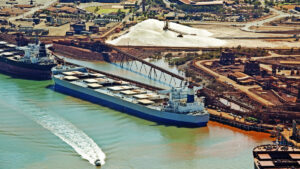So far shielded from the worst impacts of the Covid-19 pandemic, the emergence of the Omicron strain in Western Australia has raised the prospects of supply disruptions in some of the world’s largest commodity markets.
That could see upwards pressure on prices in everything from iron ore and lithium – two commodities where WA is responsible for a remarkable 60% of global supply – to zircon, where WA accounts for 40% of the market, gold, nickel, alumina and titanium feedstock.
While WA delayed the opening of its hard border amid fears it could suffer similar health and supply chain impacts as has been seen over east, the Omicron variant has wriggled its way into the state and is now spreading.
WA now has 131 active cases, two of whom are in hospital.
Notably, an outbreak of 17 cases in Bunbury, including 13 workers and four close contacts at the Albemarle-MinRes lithium plant, could cause further delays to a mega project impacted already by labour shortages and, until last year, weakness in the lithium market.
Prices for the commodity are now up around 400% from their lows in late 2020 due to a quicker than expected supply shortage, with further pressure on supply a potential risk to lithium chemical producers and downstream industries like electric vehicle makers.
An outbreak at a Pilbara iron ore mine – potentially avoided last week when Rio Tinto identified two Covid-positive workers at Perth Airport with its pre-flight testing regime – could cause serious supply pressures to a market already coping with the absence of high-grade supply from Brazilian operations shut due to torrential flooding this month.
“WA is the world’s largest supplier of seaborne iron ore and lithium (in spodumene concentrate),” UBS’ Lachlan Shaw said.
“Almost 60% of global iron ore and lithium supply is sourced in WA. Potential COVID disruption and delay risk directly to the miners and indirectly to their supply chains is greatest in these commodities. But WA also makes decent contributions to global zircon, manganese, alumina, titanium feedstock and nickel supply.”
Winners and loser
There are big winners in supply shocks, like the Aussie iron ore miners who got to feast on record prices early last year when Brazil’s Vale struggled to ramp up in the face of rising Chinese demand.
But there are losers too.
“When supply disruption leads to higher prices, the winners and losers depend on who is the producer being disrupted,” Shaw said.
“If COVID disruptions emerge and remain site and company-specific, industry peers can capitalise to the extent their operations may be less impacted and they can make the most of higher commodity prices.
“But if COVID disruptions impact miners and industry to a similar extent, then the benefits of higher prices may only go towards compensating for lower volumes.”
Outside iron ore, WA produces most of Australia’s supply of gold, around 11% of the world total, 10% of alumina supply, 5-10% of mined nickel and ~10% of titanium feedstock.
It is also a minor producer of manganese, copper and other base metals.
Ramelius feels the squeeze of labour shortage
Gold miner Ramelius Resources (ASX:RMS) says a labour shortage including a lack of truck drivers for its vast WA gold network is putting a handbrake on production.
Ramelius produced 66,919oz at all in sustaining costs of $1493/oz in the December quarter at the Edna May and Mt Magnet mines in WA, tallying 132,605oz at $1473/oz for the first half.
That puts it on track to meet the lower end of its guidance range for FY22 of 260,000-300,000oz at $1425-1525/oz.
But the company said it has made allowances for “the actual impacts of the delayed WA border re-opening and/or any future Covid-19 infections to mine site personnel or supply pipeline disruptions” which are “difficult to accurately assess at this time”.
Ramelius is heavily reliant on truckies because its operations consist of central processing hubs with large satellite mines, some over 100km away in the case of Edna May’s Marda and Tampia satellites.
Reaction to the continued border closure has been mixed. Many members of the West Australian public are quietly supportive of the measure, owing to the extraordinary popularity of Premier Mark McGowan and fear of the health impacts of opening the border.
Some miners, including Mineral Resources and iron ore magnate Gina Rinehart, are reportedly keen on the border staying up despite issues accessing labour from over east and overseas, but Fortescue Metals Group (ASX:FMG) CEO Elizabeth Gaines and Evolution Mining (ASX:EVN) boss Jake Klein, who is based in Sydney, both think it should go.
Klein said yesterday the State was “deferring the inevitable”.
In research released today WA’s Chamber of Commerce and Industry said 65% of 400 businesses surveyed say the delay of the border opening will be negative for them, with just 23% saying it will be positive.
“The survey results reinforce CCIWA’s calls for the State Government to set a new reopening date as soon as possible and for the key rules attached to the Safe Transition Plan to also be announced,” CCIWA chief economist Aaron Morey said.
“The results also clearly reflect the need for compensation to be provided to impacted businesses.
“Many businesses report multi-million dollar losses, with an average cost of $2.5 million estimated by respondents.”
Ground breakers share price today:
You might be interested in












